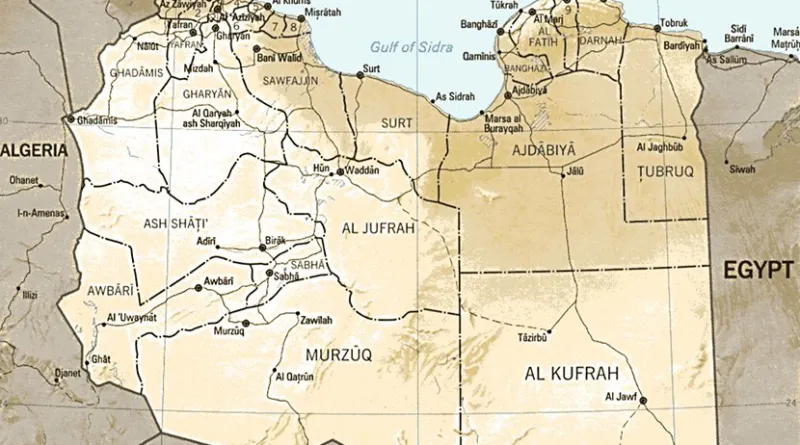The Minister of Oil and Gas in Libya’s Government of National Unity (GNU), Mohamed Aoun, wants to increase investment in Libya because it is the first step toward increasing oil production. A meeting was held with the Vice President of International Governmental Affairs and Political Risks of the company ConocoPhillips to encourage it to continue investing in Libya, that it is ready to provide technical assistance, and that the situation in Libya is improving.
The minister emphasized the speedy implementation of projects that will have an impact on increasing oil and gas production, such as the North Gallo project and plot NC 98. Al-Hariqa oil port also received the second million-ton tanker at the beginning of 2023. The oil tanker “CAP FELIX ” docked at port of Marsa al Hariga to ship one million barrels of crude oil on its way to China. This is the second million-liter oil tanker at the beginning of the new year, carrying the Belgian flag and coming from Italy. The production received from the Mesala and Sarir fields amounted to 210 thousand barrels, through a pipeline with a length of 513 km and a diameter of 34 inches.
In addition, the production witnessed an increase after declining last week to 140,000 due to electricity problems in the Masala and Sarir fields. Shipping and export operations are taking place according to precautionary steps to combat the Corona epidemic, as well as preserve the environment, which are among the priorities of the Arabian Gulf Oil Company. While oil prices recorded their largest weekly loss in January, as job growth in the United States did not help the crude oil markets, WTI settled at the close of trading at $73.77 a barrel, after rising to $75.45 earlier in the session. The US crude index also fell by nearly 9%, marking its largest weekly decline since the week ending December 2.
The bad weekly performance came after West Texas Intermediate crude fell 10% between Tuesday and Wednesday, the worst for the first two trading days in the year since 1991. London-traded Brent crude closed down 12 cents, or 0.2%, at $78.57 a barrel. The global benchmark reached a high of $80.56 earlier on Friday. Over the course of the week, it fell by nearly 9%. which led to the collapse of crude oil prices in the first week of the year and will result in a global recession, and the markets are still betting on the Central Bank raising the interest rate by 25 basis points in its next policy decision in February, after raising it by 425 basis points in the past year.
The government confirmed that we need to increase production rates because the total foreign exchange the state will use during 2022 amounts to 4,417 billion US dollars. The uses included 247 million salaries of workers abroad, 142 million scholarships for students studying abroad, and 163 million treatments abroad.
The uses included $2.365 billion to the National Oil Corporation and 512 million transfers for the benefit of other parties, which are payments of existing credits for the benefit of public agencies, likewise, 269 million for the medical supply device, 465 million for the General Electric Company, 55 million for education and higher education, and 166 million for other parties.
The source is required for additional translation information. Other attempts to get out of the crisis were made through Cairo, where a meeting was held between the Speaker of the Libyan House of Representatives, Counselor Aguila Saleh, and the head of what is known as the State Council, Khaled Al-Mashri. A joint statement was issued announcing their agreement that “the joint committee between the two houses shall refer the constitutional document leading to the elections that will resolve the crisis to the two houses for approval.” “According to the system of each council.” And it was agreed to put in place a clear road map to complete all the necessary procedures to complete the electoral process, which are related to the foundations and laws, or executive procedures, and the unification of institutions.
Ahmed Aboul Gheit, the Egyptian Foreign Minister, appealed to all Libyan parties to secure the holding of national elections for permanent stability and to initiate the process of construction, reconstruction, and development. The United Nations Support Mission to Libya also issued a statement urging “Libyan political leaders to expedite agreement on complete, final, and time-bound arrangements to move the country towards elections in 2023.”
The mission “emphasized that it is the duty of political leaders to show a commitment to achieving lasting peace by building on previous agreements of the House of Representatives and the High Council of State, with the aim of resolving the political crisis by holding elections as soon as possible.” “It is important for the Libyan people, and they have the right to choose their leaders and restore legitimacy to state institutions in order to achieve a national consensus that paves the way for a Libyan-Libyan solution to the protracted political crisis.”
Since 2022, Libya has been witnessing a political crisis represented by a conflict between two governments, the first is the government of Fathi Bashagha, which was assigned by the House of Representatives, and the second is the outgoing government of national unity headed by Abdul Hamid al-Dabaiba, who refuses to hand over power except to a government that comes through a new parliament that the people choose through upcoming elections. To solve that crisis, it launched a national dialogue on the future of Libya. The United Nations initiated the formation of a joint committee from the House of Representatives and what is known as the State Council to agree on a constitutional basis that leads the country to elections as soon as possible.

